Monitored Markov Decision Processes
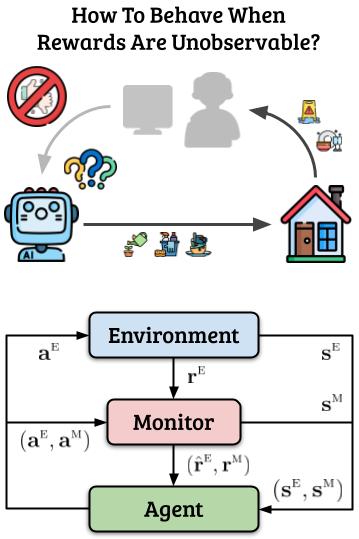
In RL, an agent learns by interacting with an environment and receiving rewards for its actions. However, the assumption that rewards are always observable is often not applicable in real-world problems. Consider the situation where the agent is tasked with household chores, and the quality of its behavior is provided through rewards from the homeowner and smart sensors. What if rewards are not always observable, e.g., if the owner is not present or the sensors are malfunctioning? In such situations, the agent should not interpret the lack of reward as meaning that all behavior is equally desirable. Neither should it think that avoiding monitoring or intentionally damaging sensors is an effective way to avoid negative feedback.
In a preliminary work presented at AAMAS, we formalized a novel but general RL framework — Monitored MDPs — where the agent cannot always observe rewards. Instead, the agent observes proxy rewards provided by a separate MDP the — monitor. We discussed the theoretical and practical consequences of this setting, showed challenges raised even in toy environments, and proposed algorithms to begin to tackle this novel setting. This paper introduced a powerful new formalism that encompasses both new and existing problems, and laid the foundation for future research. In our NeurIPS follow-up, we presented a novel exploration paradigm to overcome the limitations of classic optimistic strategies, known to fail under partial observability of rewards. Although very general and applicable to MDPs as well, our directed exploration proved to be especially effective in Mon-MDPs, setting the stage for future exploration methods. In our ICML follow-up, we further tackled the case where some rewards are never observable, and developed an algorithm that takes advantage of a known monitor.
References
Model-Based Exploration in Monitored Markov Decision Processes
Alireza Kazemipour, Simone Parisi, Matthew E. Taylor, Michael Bowling
International Conference on Machine Learning (ICML), 2025
Beyond Optimism: Exploration With Partially Observable Rewards
Simone Parisi, Alireza Kazemipour, Michael Bowling
Neural Information Processing Systems (NeurIPS), 2024
Monitored Markov Decision Processes
Simone Parisi, Montaser Mohammedalamen, Alireza Kazemipour, Matthew E. Taylor, Michael Bowling
International Conference on Autonomous Agents and Multiagent Systems (AAMAS), 2024
Learning and Transfer of Exploration Policies
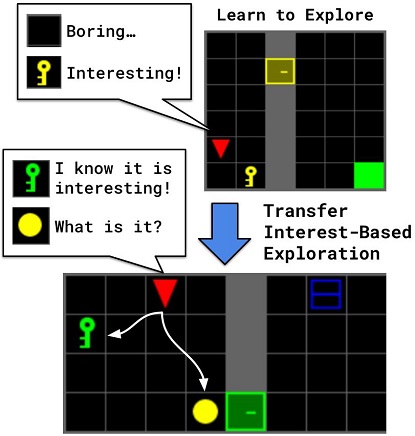
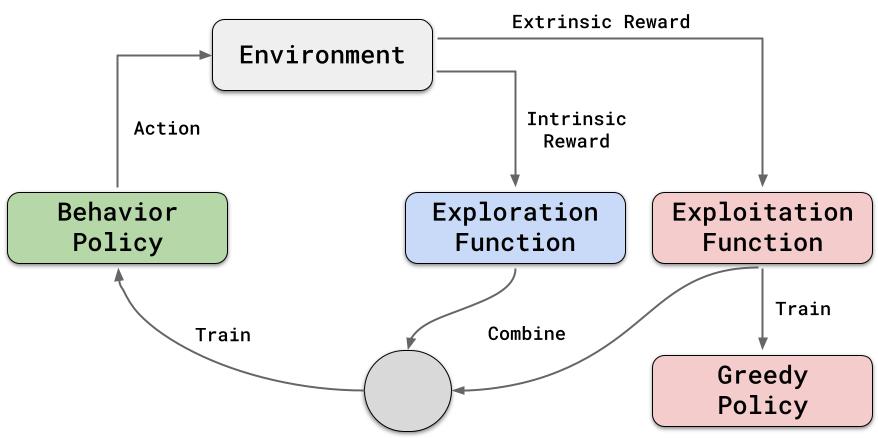 Classic RL exploration is task-driven (the extrinsic reward is the main drive of exploration)
or makes use of myopic intrinsic rewards (they depends the most promising short-term actions).
Furthermore, learning follows a tabula-rasa approach — the agent learns from scratch,
assuming isolated environments and no prior knowledge or experience.
Classic RL exploration is task-driven (the extrinsic reward is the main drive of exploration)
or makes use of myopic intrinsic rewards (they depends the most promising short-term actions).
Furthermore, learning follows a tabula-rasa approach — the agent learns from scratch,
assuming isolated environments and no prior knowledge or experience.
In a preliminary work published in Algorithms, we presented a novel approach that (1) plans exploration actions far into the future by using a long-term visitation count, and (2) decouples exploration and exploitation by learning a separate function assessing the exploration value of the actions.
In a NeurIPS paper, we proposed a novel framework to pre-train and transfer exploration in a task-agnostic manner. The agent first learns how to explore across many environments, driven only by a novel intrinsic rewards and without any extrinsic goal. Later on, the agent transfers the learned exploration policy to better explore new environments when solving tasks. The key idea of our framework is that there are two components of exploration: (1) an agent-centric component encouraging exploration of unseen parts of the environment based on an agent's belief; (2) an environment-centric component encouraging exploration of inherently interesting objects.
The results of our approach were extremely promising, and open several avenues of research. Is there a universal formulation of intrinsic curiosity and interestingness? How important are state representation to learn / transfer exploration policies? Can we use out-of-domain data — e.g., collected from the internet — to train exploration policy?References
Long-Term Visitation Value for Deep Exploration in Sparse Reward Reinforcement Learning
Simone Parisi, Davide Tateo, Maximilian Hensel, Carlo D'Eramo, Jan Peters, Joni Pajarinen
Algorithms, 2022
Interesting Object, Curious Agent: Learning Task-Agnostic Exploration
Simone Parisi, Victoria Dean, Deepak Pathak, Abhinav Gupta
Neural Information Processing Systems (NeurIPS), 2021
Learning and Transfer of State Representations

In computer vision and natural language processing, recent advances have allowed researchers to exploit massive amounts of data to pre-train perception models. These models can be successfully used "off-the-shelf" to solve many different downstream applications without any further training. On the contrary, in RL many algorithms still follow a "tabula-rasa" paradigm where the agent performs millions or even billions of in-domain interactions with the environment to learn task-specific visuo-motor policies from scratch.
By investigating these fundamental questions, we succeeded at making a single off-the-shelf vision model — trained on out-of-domain datasets — to be competitive with or even outperform ground-truth features on all the four control domains. As efficient compact state features are hard to estimate in unstructured real-world environments and the agent needs to rely on raw vision input, our model can be extremely beneficial by dramatically reducing the data requirement and improving the policy performance.
References
The (Un)Surprising Effectiveness of Pre-Trained Vision Models for Control
Simone Parisi*, Aravind Rajeswaran*, Senthil Purushwalkam, Abhinav Gupta
International Conference on Machine Learning (ICML), 2022
Improving Actor-Critic Stability
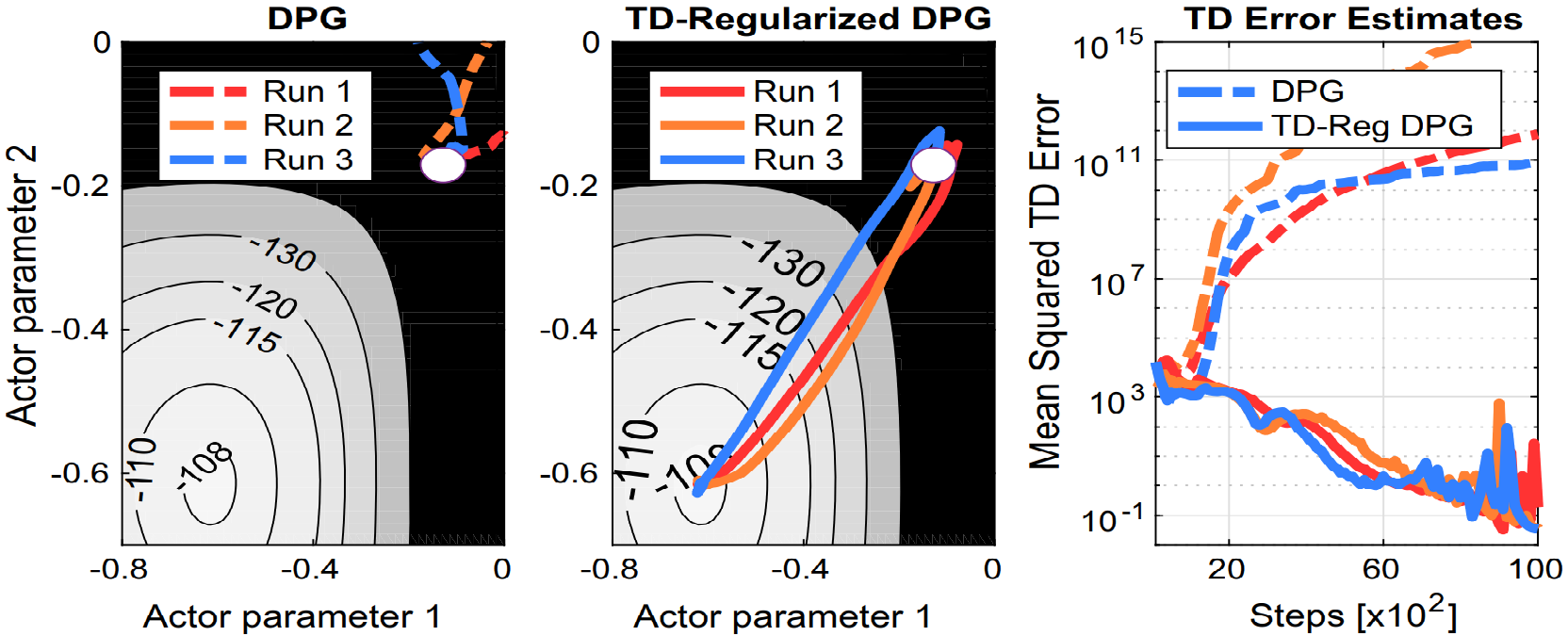 Actor-critic methods can achieve incredible performance but they are also prone to instability.
This is partly due to the interaction between the
actor and the critic during learning: an inaccurate step taken by one might adversely
affect the other and destabilize the learning.
Actor-critic methods can achieve incredible performance but they are also prone to instability.
This is partly due to the interaction between the
actor and the critic during learning: an inaccurate step taken by one might adversely
affect the other and destabilize the learning.
References
TD-Regularized Actor-Critic Methods
Simone Parisi, Voot Tangkaratt, Jan Peters, Mohammad Emtiyaz Khan
Machine Learning, 2019
RL Applied to Robotics: The Tetherball Platform
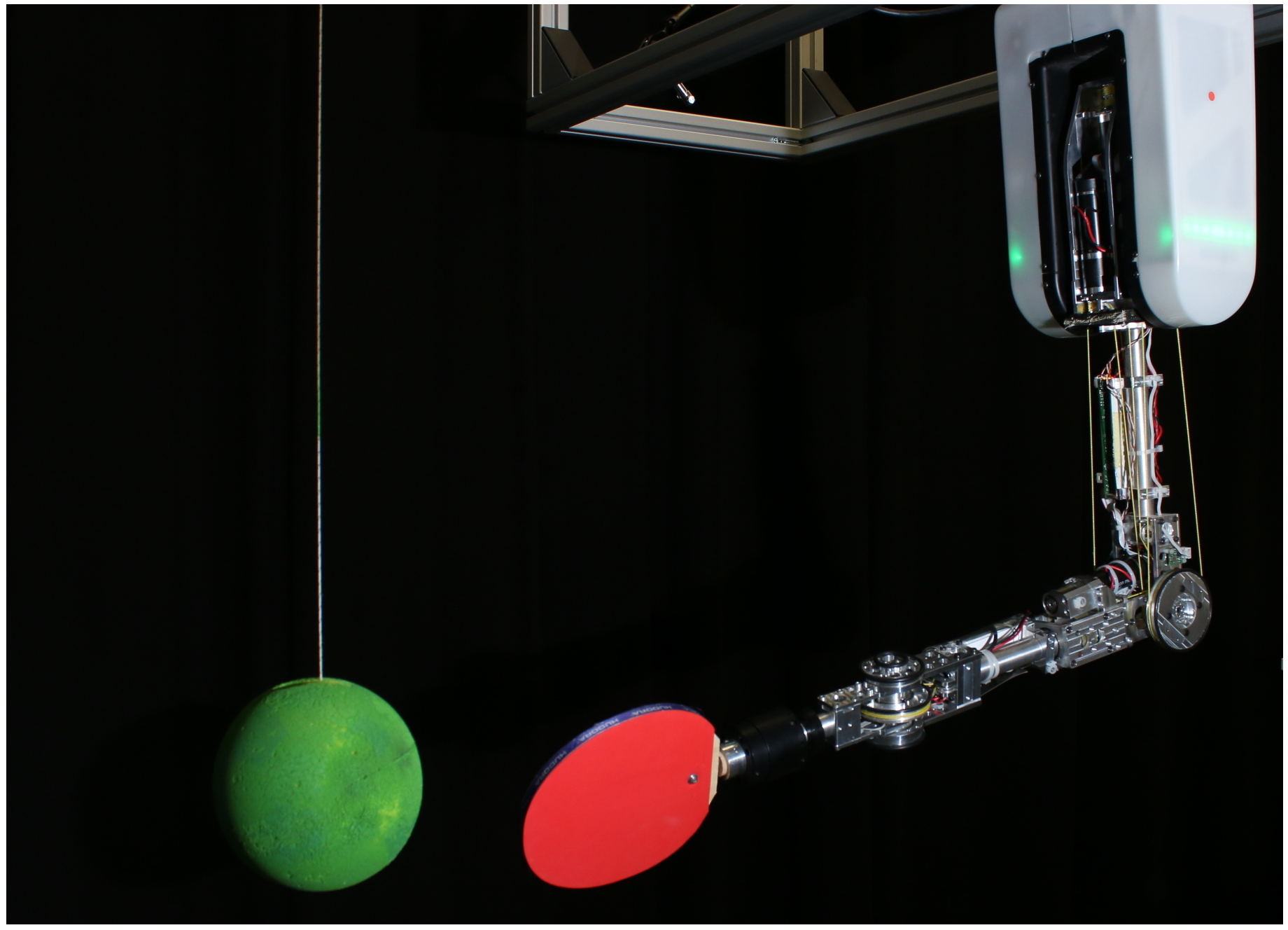 Motor skills learning is an important challenge in order to endow robots with the ability
to learn a wide range of skills and solve complex tasks.
In the last decade, RL has been shown the ability to acquire a variety of skills,
ranging from the game ball-in-a-cup to walking and jumping.
Motor skills learning is an important challenge in order to endow robots with the ability
to learn a wide range of skills and solve complex tasks.
In the last decade, RL has been shown the ability to acquire a variety of skills,
ranging from the game ball-in-a-cup to walking and jumping.
References
Reinforcement Learning vs Human Programming in Tetherball Robot Games
Simone Parisi, Hany Abdulsamad, Alexandros Paraschos, Christian Daniel, Jan Peters
International Conference on Intelligent Robots and Systems (IROS), 2015
Multi-Objective RL

Many real-world control applications are characterized by the presence of multiple conflicting objectives. In these problems, the goal is to find the Pareto frontier, a set of policies representing different compromises among the objectives.
References
Manifold-based Multi-objective Policy Search with Sample Reuse
Simone Parisi, Matteo Pirotta, Jan Peters
Neurocomputing, 2017
Multi-objective Reinforcement Learning through Continuous Pareto Manifold Approximation
Simone Parisi, Matteo Pirotta, Marcello Restelli
Journal of Artificial Intelligence Research (JAIR), 2016
Policy Gradient Approaches for Multi-Objective Sequential Decision Making
Simone Parisi, Matteo Pirotta, Nicola Smacchia, Luca Bascetta, Marcello Restelli
International Joint Conference on Neural Networks (IJCNN), 2014